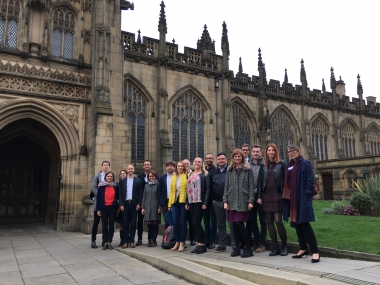Manchester’s Road to Net Zero 2038
Edited on
29 March 2021The Paris Agreement on Climate Change committed countries to restrict carbon emissions so that global temperatures don’t rise more than 1.5 degrees above pre-industrial levels. With around 70% of emissions being generated in urban areas, cities have a strong motivation to lead on combatting climate change – and as in the case of Manchester, have set more ambitious targets than national government. The city of Manchester (UK) has committed to be carbon neutral by 2038. The city is working with the Manchester Climate Change Agency (MCCA) on the city framework to support this journey and have set out a Climate Change Action Plan (CCAP) which is a top priority for the city.

Through URBACT the city of Manchester has engaged in 2 environmental action projects, C-Change and Zero Carbon Cities (ZCC). C-Change is a good practice Transfer Network and ZCC is an Action Planning Network.
On C-Change, the Manchester Arts Sustainability Team (MAST) acts as the ‘Good Practice’. MAST worked with Julie’s Bicycle on its 5-year report to share the model through URBACT and to set out ambitions for the next 5 years, predicting further reduction of around one third of direct emissions.
Through C-Change, the arts and culture sector has been developing its sector action plan which forms part of the CCAP. Although the sector emissions are only 1%, it has many challenges particularly around venue operation as arts venues are often old buildings which are not energy efficient. However, the true value of the sector is it strength in engaging with citizens and supporting their behaviour change.
During the life of C-Change, Manchester declared its climate emergency where the 2038 target was endorsed by the city council. In response to this, the second URBACT project, Zero Carbon Cities was developed.
ZCC is working to share good practice around the transition to zero carbon. Energy Cities are the Lead Expert on the project, and Manchester are the lead partner of the consortium made up of 7 cities in total, including: Bistrita, Frankfurt, Modena, Vilvoorde, Tartu and Zadar. In Manchester, the City Council are working with the Manchester Climate Change Agency and Partnership, and are also supported by experts like the Tyndall Centre, Anthesis and CDP. The project builds on two aspects of the Manchester approach. Firstly, the adoption of targets informed by the latest climate science, and secondly a city-wide approach, that can support all sectors to contribute to the change.
URBACT networks are there to support information sharing from European cities of all sizes. As climate change becomes ever more important – Manchester has been keen to reach out to other cities who are committed to climate action, so both C-Change and Zero Carbon Cities provide an opportunity for Manchester to further their climate change goals. They are one of a small number of URBACT networks directly addressing this issue and help us link in with other networks looking at sustainability, transport and related issues.
Zero Carbon Cities is an Action Planning Network – so the aim is slightly different than C-Change which has the objective of sharing existing good practice. We’re all aware that the type of action needed to achieve real change is substantial, and ZCC can help C-Change by providing better understanding of the overarching context, above and beyond the cultural sector. As we look to develop the city’s action plan, we can support understanding of the required systemic change, which in turn can filter down to the changes that the culture sector needs to make.
Zero Carbon Cities has been impacted by Covid-19, so we are at the start of developing an integrated action plan for each city.
So far we have instigated a Masterclass programme which will provide expert sessions around science-based targets, carbon budgeting, city governance, and support for implementing our zero carbon ambitions; worked with Manchester Climate Change Agency to set out a roadmap for the next year – including a refresh of the city’s climate change framework; and started to look at a number of sub-themes, around public participation, and carbon literacy.
In addition we are looking at other URBACT networks around sustainability, the circular economy and modal transport shift.
Covid-19 has meant we’ve had to consider how to work together and share best practice in a meaningful way. This means shorter meet ups, more regularly, and more focused on sharing best practice and introducing experts to the network. What is transferable between the cities is less about their particular challenges, but how they are responding to them – through partnerships, political leadership, and through pulling down regional, national and international funding. Over the next 18 months we hope to develop a toolkit to help cities deliver on their action plans. Whether science-based targets are currently being followed by cities or not, there is still a need to develop our understanding of the climate science further, and to react quicker to what it’s telling us in order to reach our zero carbon ambitions.
It's important that groups such as MAST that have a strong commitment to carbon reduction are supported, and by us being clearer about the big challenges, especially around heating, travel, and buildings, the hope is that the cultural sector will be able to both play its part, and be supported. MAST is a member of the Manchester Climate Change Partnership so will continue to contribute directly to the Manchester Climate Change Framework setting out future action for the arts and culture sector to zero carbon 2038.
Submitted by Laura McIntosh on
